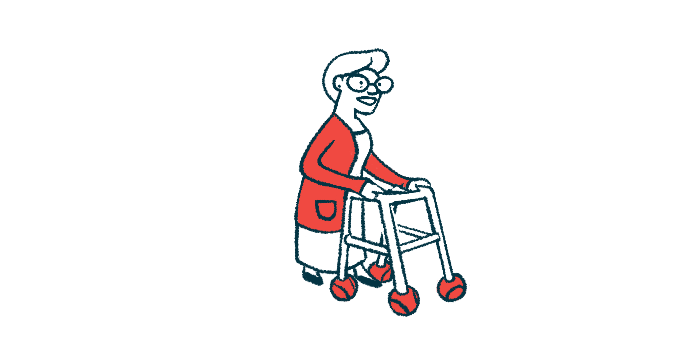Ocrevus in real world may also help severely disabled MS patients
Approved therapy may help some in group excluded from trials: Analysis

Treatment with Ocrevus (ocrelizumab) may stabilize disability progression in people with multiple sclerosis (MS) who have severe walking impairments — a patient group excluded from clinical trials supporting the therapy’s 2017 approval — a real-world analysis suggests.
However, about half of those receiving Ocrevus in this study discontinued treatment, primarily due to side effects and a lack of perceived benefits, data indicated.
“[Ocrevus] may lead to disease stabilization in a subset of highly disabled MS patients, but possible benefits need to be carefully balanced against the incidence of adverse events in this high-risk patient population,” the researchers wrote.
Still, and “importantly, 18 patients (29.0%) reported subjective disease stability while on [Ocrevus],” the team wrote, while noting that more than 45% of participants did not experience any side effects over the course of the study.
The real-world study, “Ocrelizumab in Highly Disabled Progressive Multiple Sclerosis Patients,” was published in the journal Multiple Sclerosis and Related Disorders.
Patients in study needed 2 walking aids for 100-meter walk
Ocrevus is an antibody-based therapy widely approved for MS, an autoimmune disease marked by immune cells that attack healthy parts of the nervous system. The symptoms of MS vary widely among patients, depending on which parts of the nervous system are affected. In more advanced cases, patients may lose their ability to walk independently.
Administered via intravenous or into-the-vein infusions, the therapy works by targeting the CD20 protein on the surface of mature immune B-cells, causing their death. The goal is to reduce the inflammatory attacks that mark MS and to slow the progression of disability.
However, because the initial clinical trials that supported Ocrevus’ approval excluded people with MS with higher levels of walking disability, its impact on this patient population has not been established.
To learn more, researchers at the Brigham and Women’s Multiple Sclerosis Center, in Boston, reviewed medical records of MS patients with severe disability — specifically, those with an Expanded Disability Status Scale (EDSS) score of 6.5 or higher at the time they began Ocrevus treatment. This score means that these patients needed two walking aids to walk 100 meters (about 330 feet) without stopping to rest, or had an even greater walking impairment.
“This study aimed to describe the access to, and tolerability and therapeutic outcomes of [Ocrevus] in highly disabled MS patients in a real-world setting,” the researchers wrote.
Of the 62 patients selected for the analysis, most were white individuals (82.3%) and nearly two-thirds (64.5%) were women. The average age of the patients was 62.1.
Among them, 49 (79%) were diagnosed with secondary progressive MS, and 13 (21%) had primary progressive MS. In these progressive types of MS, patients’ symptoms typically worsen steadily without the relapses that characterize other forms of the disease.
Reductions in disability scores seen for two-thirds of MS patients given Ocrevus
The patients had received an average of 3.7 disease-modifying therapies prior to starting Ocrevus. Their primary reason for beginning treatment was physician-reported evidence of progression (41.9%) or patient-reported progression (27.4%), or to prevent such progression (12.9%). The average time on Ocrevus was about three years.
Treatment was discontinued by nearly half of the patients (46.8%) before the end of the study period. Their reasons for stopping the therapy primarily were side effects (58.6%) or MS progression or lack of perceived benefit (41.4%). Worry about COVID-19 safety was cited for 20.7%, while financial obstacles were given as a reason for 3.4%.
A little more than half of the patients (53.2%) reported side effects, which were mostly mild to moderate. The most common side effects were frequent infections (63.6%), followed by infusion reactions (24.2%).
The results showed that 66.1% of patients experienced no disability progression after about three years on Ocrevus, as assessed by a reduction in EDSS scores. A total of 8.1% had some easing of disability — reported as improvements — as seen in their EDSS scores. About one-quarter of the patients (25.8%) experienced disability worsening.
Progressive [MS] patients with higher levels of disability may experience comparable benefits from [Ocrevus] treatment to progressive patients that are more ambulatory [able to walk].
In comparison, 29% patients said their disability had stabilized with no disease progression, while 67.7% patients reported continued subjective progression.
According to researchers, “progressive patients with higher levels of disability may experience comparable benefits from [Ocrevus] treatment to progressive patients that are more ambulatory [able to walk].”
There was no difference in outcomes between those with primary or secondary progressive MS. One patient with secondary progressive MS died from severe infection and kidney failure, but this individual had stopped Ocrevus two years prior due to frequent infections.
“Our study reports on the safety and effectiveness of [Ocrevus] in MS patients with significant levels of disability, and suggests that it may be a useful therapeutic strategy in up to a third of these patients in appropriate clinical setting,” the researchers concluded.
“More research is needed to help identify those highly disabled [people with MS] who would most benefit from [Ocrevus] use,” the team added.








